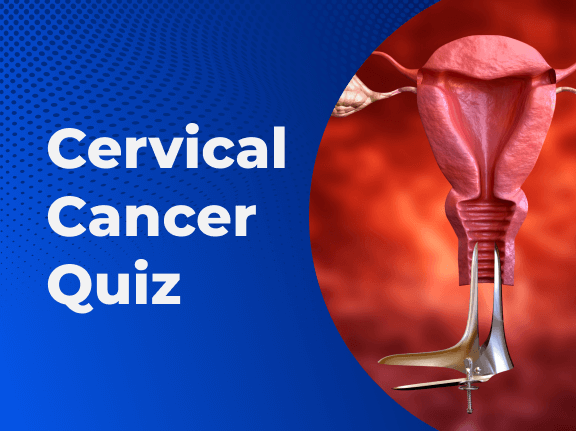
Cervical Cancer Quiz
This online assessment takes only 2 minutes. It will help you find the right clinical trials for you.

Fiona Evans
We ask this to determine which clinical trials you may be eligible for.
If you need to contact us right away?
Call +1 844 627 7246Your personal data is fully confidential and 100% secure
Cervical cancer quiz has questions about cervical cancer diagnosis, prevention, and awareness. According to the World Health Organization (WHO), cervical cancer is the fourth largest cancer type observed among women. Thankfully, the chance of acquiring the disease – and dying from it – has dropped considerably since the usage of the Pap smear, a routine screening procedure.
Through cervical cancer quiz, you can find statistical information about cervical cancer. Women ages between 30 and 65 should be screened each three years with a Pap test or every five years with an HPV test. Persistent HPV with an infection presents danger of growing cervical cancer. Sometimes this could be over an interval of 10 to 20 years. Smoking increases cervical cancer diagnosis, as does having multiple intercourse partners and/or a historical past of cervical dysplasia. Cervical dysplasia is a situation marked by development of irregular cells (irregular cell growth) on the floor of the cervix. In addition, women who are chronically immunosuppressed as a result of taking certain medicines, such as steroids, having a transplant or having an HIV infection, can also have elevated exposure to cervical cancer.
How Can Cervical Cancer Be Detected?
Cervical cancers begin from pre-cancerous cells and the changes that happen to those cells over time – this can normally take many years. An abnormal cervical screening test outcome means that you have modifications in the cells overlaying the neck of your womb (cervix). When this is detected in its earliest phases, cervical cancer can be treatable. According to the American Cancer Society, deaths from cervical cancer have declined considerably with elevated screening through Pap tests. Unfortunately, Cervical cancer usually does not show symptoms till later stages. If you experience any symptoms, you shall discuss to your doctor about screening for cervical cancer.
Almost Done!
Please complete the required fields and we will send results to your email.
You have completed the quiz.
0 out 0 answers are correct

We ask this to determine which clinical trials you may be eligible for.
Fiona Evans Massive Bio Patient Relations CoordinatorIf you need to contact us right away?
Call +1 844 627 7246Your personal data is fully confidential and 100% secure

© 2024 Massive Bio. All rights reserved








